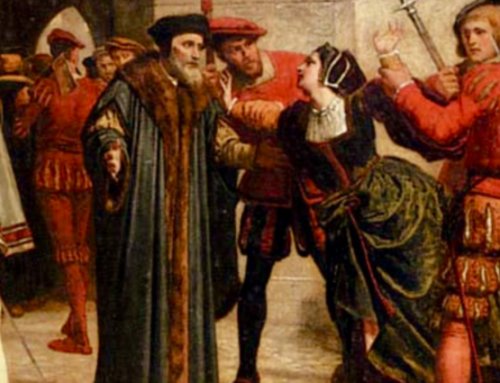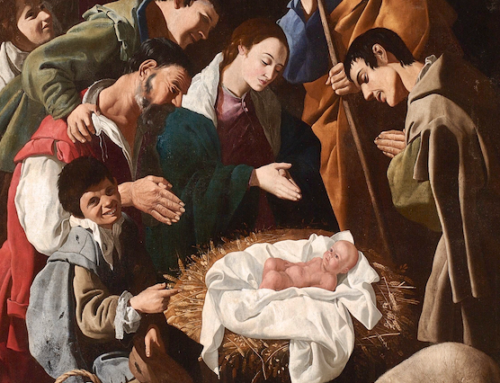Here is the grand fact that Protestant theologians always overlook. They, in reality, always present nature and grace as two antagonistic powers, and suppose the presence of the one must be the physical destruction of the other. Luther and Calvin, weary of the good works, and shrinking from the efforts to acquire the personal virtues enjoined by Catholicity, began their so-called reform by asserting the total depravity of human nature, and maintaining, that original sin involved the loss of reason and free-will, reducing man physically to the condition of irrational animals, and superadding the penalty of guilt. Here, in the very outset, they denied natural reason, all natural religion, and all natural morality, and consequently asserted for man in the natural order, left to his natural powers and faculties, universal skepticism and moral indifference; for without reason there can be no belief, and without free-will no moral obligation, no moral difference of actions. —Orestes Brownson, “Protestantism in a Nutshell”
It is often thought—in part because of irresponsible polemic masquerading as scholarship or learned analysis from people who ought to know better,[1] in part because of Protestants’ equally inexcusable neglect of their own tradition—that the Protestant Reformers held no brief for natural law or for the wisdom of the Greeks and Romans. Fewer claims sit less easily with the truth of things than this one; but it has by now become a convention, and, as conservatives know (and usually celebrate), conventions die hard.
The consensus position has begun to change in recent years due to a return ad fontes among many Protestant scholars.[2] In this brief essay, I’d like to look at one example of why this consensus must continue to be modified in a more historically responsible direction: Philip Melanchthon’s preface to Cicero’s On Duties, written in 1525. Melanchthon (1497-1560), one of the chief and most influential figures among both the Protestant Reformers and northern European humanists, found a wealth without parallel for the study of ethics in Greek and Roman authors, and particularly in the writings of Cicero and Aristotle; and the former’s On Duties held a position in the first rank for him (as, indeed, it did later for the American Founders).
In his introduction to the book, Melanchthon writes, in part, as follows in order to set the stage for his more particular remarks on Cicero’s treatise:
This, in short, is solid erudition: to be able to judge rightly about things and morals, [and] next to explicate clearly and advantageously about the things you have comprehended, and to discourse eloquently [about them]. The knowledge of things is necessary for judging rightly and for acquiring prudence.[3]
He goes on to distinguish the “things” about which one must know (mathematics, instructions about “civic morals,” and so on) from eloquence about those things—which he treats in the second part of the preface and with which I will not deal here—while making it clear that he is not talking at all about religion in this context (de religione hic nihil dicimus; more on this below).
For civic morals, tradition is a particularly valuable guide: And for common life [that is, for man’s life together—ed.] it is first of all useful to hold fast to those things that have been handed down about morals and about the customary manner of civic life.
Indeed, for Melanchthon this is not an optional “extra” for civilized life, but a field of study whose absence indicates barbarism and the loss of the humane itself:
Whoever is not ennobled by this type of learning and accustomed to human kindness and civic duties you would call a beast, not a man. For this literature [of the kind I am discussing] [that is, the works of the Greeks and Romans—ed.], by which tender minds are nourished and roused to an honorable life, is the cradle and commencement of virtue.
And in the opinion of the Wittenberg Reformer, one book stands out above all with respect to “ennobling learning”:
There is, moreover, on the subject of morals no other book in existence more perfect than Cicero’s On Duties. For he has given instruction most carefully on all the parts of life, in regard to what is fitting for each of its stages.
What is so valuable about this book? Chiefly its discussion of the virtues under their fourfold aspect, a categorization that goes back (at least) to Plato’s Republic:
[H]e has put forward in their right order the forms of the virtues, such that they stand out before the eyes of his readers, as rules [regulae] of all deliberations and deeds. For he has set out the four parts of virtue: prudence, justice, courage, [and] moderation.
These are hardly the words of a radical. On the contrary, Melanchthon (Martin Luther’s right-hand man, it should be noted) here explicitly makes himself the heir of an ethical tradition running from Plato, Aristotle, and Cicero down through the Middle Ages to his own day, and without the anxiety—or indeed outright absurdity—that would be required if Brownson were correct in his assessment of the early Protestants.
The discussion of Cicero in On Duties is to serve as the foundation for German pupils’ understanding and reflection upon their own moral duties, which Melanchthon expresses with a mythical allusion. He writes:
Let young people place these things before themselves as common-places, in order that they may refer all their deliberations about morals thither, and in order that those who are to judge what is fitting may follow them [that is, the common-places—ed.] as the thread of Theseus.
Several things from this passage should be marked: Melanchthon invokes the classical rhetorical idea of loci, or “topics,” to explain how On Duties should be approached. As Ken Schurb notes, “[T]he loci of any given subject constituted that subject’s fundamental structure, the most basic tenets of the discipline. They established its boundaries.”[4] It was a method Melanchthon would make famous in his own time as a basic form of Protestant divinity, where Paul’s letter to the Romans served as the organizing principle. Next, Melanchthon incorporates a further feature of Cicero’s discussion by insisting that morality in general should follow “the fitting,” a category that Cicero borrowed from the Stoic Panaetius and further modified. In his discussion of the fitting (On Duties 1.93-151), it emerges that, while it is most closely related to temperance or moderation (Panaetius had counted it the fourth cardinal virtue after prudence, justice, and courage), it nevertheless has a bearing on all of the virtues. As Cicero says,
[The fitting] is inseparable from the honourable, for whatever is fitting comes into view only when the honourable [Cicero’s chief category—ed.] precedes it. It is easier to grasp rather than define the nature of the difference between the honourable and the fitting…. [T]here is an aspect of the fitting which is perceptible in every virtue, and can be detached from them more in theory than in practice.[5]
Finally, because he is a good classical rhetorician and therefore appeals not only to the reason, but also to the imagination, he makes reference to one of the most well-known Greek stories: The young are to follow Cicero as the “thread of Theseus.” Melanchthon refers, of course, to the story of the Cretan Labyrinth, where Theseus slew the Minotaur and found his way out again by following a string, given to him by Ariadne, that he had tied to the entryway of the maze. Civic life, in other words, is confusing, and without some guiding principle we shall be lost; for Melanchthon, Cicero provides that guiding principle.
Another example, this time from history rather than myth (or, rather, from history and myth), follows:
For as Zeuxis, when he was painting Helen of Croton, had enclosed in his mind a most beautiful womanly form, or, as the Greeks say, an εἶδος [eidos, “form”] that he had gathered from many examples, in the same way it is proper that those who will make judgements about morals have in mind descriptions of the virtues as forms, as it were, which they might consult, which they might contemplate, upon which they might fix their eyes, as often as they deliberate about the honorable.
Zeuxis was one of the most famous painters of classical antiquity, and his “Helen” was one of his most famous paintings. According to Cicero, who tells the story at the beginning of Book 2 of On Invention and is presumably Melanchthon’s source, Zeuxis thought that he could find no one individual beautiful enough to serve as his model for Helen, “because nature has made nothing of any class absolutely perfect in every part,” so he instead combined the features of five different women. Thus he made in his picture a composite Ideal (< eidos), a term that figures so largely in Plato’s theory of Forms. In the same way, Melanchthon’s audience is to use Cicero’s On Duties.
Again, for Melanchthon this discussion of civil morals has nothing, properly speaking, to do with religion. He writes:
Nor here am I speaking about religion, which must be sought from the sacred books. The customary manner of civic life is described by Cicero, with which religion does not conflict at all. Divine Ambrose also wrote an On Duties, I believe in order to inculcate religion in children, [a subject] about which he saw that there was no instruction in Cicero’s treatise. But I think that religion ought to be drawn from divine literature. Concerning civic morals I would prefer to listen to Cicero, who, acquainted with the greatest affairs in the chief commonwealth in all the world, learned of very many things by experience, [and] he translated very many things from the writings of the Greeks, who governed the greatest cities.
It is important to note what Melanchthon means (and does not mean) in this passage. He does not mean, pace Brownson, that there is no such thing as a natural knowledge of God (on which more perhaps another time). He is, rather, drawing on the classical Protestant distinction of the Two Kingdoms: the visible, temporal realm—the sphere of civil society—and the spiritual realm. The former is ruled by law and nature, while the latter is ruled by the gospel, which is only found in Holy Scripture: This is the true meaning of his remarks above. But that allowance does not indicate that “religion” has nothing to do with common life; indeed, the institutional church is part of the visible, temporal realm, which, for Melancthon, is subject to the care of the magistrate and whose external circumstances are governed in large measure by nature, custom, and prudence. The welfare of the church is closely connected to the welfare of society as a whole.
But in making these qualifications, we ought not to miss how striking Melanchthon’s words are. One could scarcely imagine higher praise for Cicero, whether from the American Founders or anyone else. He was expert in civic morals due to both experience and erudition, and Melanchthon advises all future citizens that it is incumbent upon them to familiarize themselves with his ethical work. Far from destroying nature and morality, early Protestants such as Melanchthon saw them as the forum in which the virtues were to be exercised and displayed. Grace does not destroy nature (note, again, that Melanchthon says that religion “does not conflict at all” with the “customary manner of civil life”); it restores it. And what it restores nature to is the created order, glimpsed even by wise pagans like Cicero.
The Imaginative Conservative applies the principle of appreciation to the discussion of culture and politics—we approach dialogue with magnanimity rather than with mere civility. Will you help us remain a refreshing oasis in the increasingly contentious arena of modern discourse? Please consider donating now.
Notes:
[1] This point is illustrated by my epigraph, in which Brownson makes so many basic errors and demonstrates such a failure of the office of charity that the rectification of its shortcomings would require considerably more space than I have here.
[2] Many examples could be cited. To cite only three (while engaging in shameless self-promotion), cf. Stephen J. Grabill, Rediscovering the Natural Law in Reformed Theological Ethics (Eerdmans, 2006); E.J. Hutchinson and Korey D. Maas, “Introduction: Niels Hemmingsen (1513-1600) and the Development of Lutheran Natural-Law Teaching,” Journal of Markets & Morality 17 (2014): 595-617; and several of the essays collected in W. Bradford Littlejohn, ed., For Law and for Liberty: Essays on the Trans-Atlantic Legacy of Protestant Political Thought (Davenant Press, 2016).
[3] All translations are my own.
[4] See Ken Schurb, “Philip Melanchthon and Loci Communes,” in Lutheranism and the Classics III: Lutherans Read History, ed. James Kellerman, Joshua Hayes, and E.J. Hutchinson (forthcoming).
[5] Cicero, On Duties 1.94-5, tr. P.G. Walsh (OUP, 2000).








I was raised a Protestant but I don’t necessarily think that we believe that reason does yield higher truths, simply that the animal nature cannot obey reason. We still believe man, with his animal nature in control, is capable of understanding
The ‘Protestant tradition’, in my experience, is to overlook the Scholastics, completely ignorant of Aquinas, in an effort to return to the Pagan Philosophers (and Old Testament), perhaps as a knee jerk rejection of Catholicism; an attempt to start over and develop a competing intellectual tradition. They have to a large degree succeeded and the resulting chaos of the modern age is the proof in their pudding. I think the author here might want to read Aterni Patris. No offense, but their alternative intellectual tradition is glaringly lacking any input from… Jesus Christ, having little or no means of employing His influence into their alternative system without encountering and contending with Aquinas, and that, my friend, is a prospect too great for them.
Awesome article! As someone raised in solo scriptura church who’s recently been getting into the history of the west it’s always comforting to find Protestant figures who don’t fit the Catholic view. It’s sad that every protestant seems to know Calvin and Luther yet few seem to know Melanchthon.